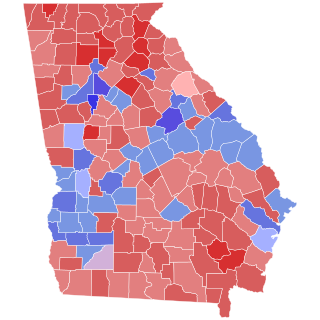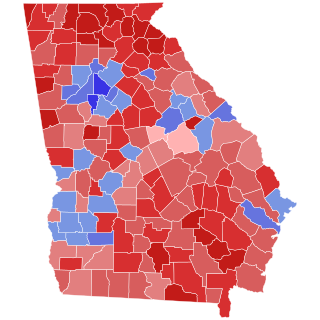Following the 2020 United States Election, both U.S. Senate seats in the state of Georgia went to runoffs concurrently held on January 5, 2021. As Democratic challengers defeated both Republican incumbents, Democrats would take control of the Senate, giving a trifecta to the newly elected president Joe Biden.
The individual 2021 Georgia runoff elections are:
The Democratic Senatorial Campaign Committee (DSCC) is the Democratic Hill committee for the United States Senate. It is the only organization solely dedicated to electing Democrats to the United States Senate. The DSCC's current Chair is Senator Gary Peters of Michigan, who succeeded Nevada‘s Catherine Cortez Masto after the 2020 Senate elections. DSCC's current executive director is Christie Roberts.

Elections in Georgia are held to fill various state and federal seats. Regular elections are held every even year. The positions being decided each year varies, as the terms of office varies. The State Senate, State House and U.S. House will typically be up for election, as all of those positions have two-year terms. Special elections are held to fill vacated offices. Georgia is one of seven states that require a run-off election if no candidate receives a majority of the vote in a primary election. Uniquely, Georgia requires a run-off election for state and congressional offices if no candidate wins a majority of the vote in a general election; only Louisiana has a similar requirement, but it operates under a different election system.

The 1972 United States Senate elections were held on November 7, with the 33 seats of Class 2 contested in regular elections. They coincided with the landslide re-election of Republican President Richard Nixon. Despite Nixon's landslide victory, Democrats increased their majority by two seats. The Democrats picked up open seats in Kentucky and South Dakota, and defeated four incumbent senators: Gordon Allott of Colorado, J. Caleb Boggs of Delaware, Jack Miller of Iowa, and Margaret Chase Smith of Maine. The Republicans picked up open seats in New Mexico, North Carolina, and Oklahoma, and defeated one incumbent, William B. Spong Jr. of Virginia.

In the 2006 Georgia elections, Incumbent Governor Sonny Perdue, the first Republican Governor of Georgia since reconstruction, was re-elected over then-Lieutenant Governor Mark Taylor (D).

The 2007 United States elections were held on Tuesday, November 6. During this off-year election, the only seats up for election in the United States Congress were special elections held throughout the year. None of these congressional seats changed party hands. There were also several gubernatorial races and state legislative elections, and numerous citizen initiatives, mayoral races in several major cities, and several types of local offices on the ballot.

The 2008 United States Senate election in Georgia took place on November 4, 2008. The run off election took place on December 2, 2008. Republican Senator Saxby Chambliss, first elected in 2002, sought re-election to his position as a United States Senator from Georgia. He was challenged by Democratic nominee Jim Martin and Libertarian nominee Allen Buckley. After a runoff election on December 2, Chambliss was elected.

2009 United States elections were held on Tuesday, November 3. During this off-year election, the only seats up for election in the United States Congress were special elections held throughout the year. In total, only the seat representing New York's 23rd congressional district changed party hands, increasing the Democratic Party's majority over the Republicans in the United States House of Representatives, 258–177.

The 1992 United States Senate election in Georgia was held on November 3, 1992. In the general election, which occurred simultaneously with the presidential election, incumbent Democratic U.S. Senator Wyche Fowler received more votes, but did not achieve a simple majority. Under Georgia law, this demanded a runoff. Paul Coverdell, the former Director of the Peace Corps, edged out Fowler in the November 24 runoff by a narrow margin, flipping the seat to the Republicans. It was the first Senate runoff election to be held in Georgia since runoffs were first mandated in 1964. This was the third consecutive United States Senate election in Georgia for this seat in which the incumbent United States Senator from Georgia lost re-election.

The 1996 United States Senate election in Georgia was held on November 5, 1996. Incumbent Democratic United States Senator Sam Nunn decided to retire instead of seeking a fifth term. Democratic Secretary of State Max Cleland won the open seat over Republican businessman Guy Millner.

The 2014 United States Senate elections were held on November 4, 2014. A total of 36 seats in the 100-member U.S. Senate were contested. Thirty-three Class 2 seats were contested for regular six-year terms to be served from January 3, 2015, to January 3, 2021, and three Class 3 seats were contested in special elections due to Senate vacancies. The elections marked 100 years of direct elections of U.S. senators. Going into the elections, 21 of the contested seats were held by the Democratic Party, while 15 were held by the Republican Party.

The 2020 United States Senate elections were held on November 3, 2020, with the 33 class 2 seats of the Senate contested in regular elections. Of these, 21 were held by Republicans, and 12 by Democrats. The winners were elected to 6-year terms from January 3, 2021, to January 3, 2027. Two special elections for seats held by Republicans were also held in conjunction with the general elections: one in Arizona, to fill the vacancy created by John McCain's death in 2018; and one in Georgia, following Johnny Isakson's resignation in 2019. These elections ran concurrently with the 2020 United States presidential election in which incumbent president Donald Trump lost to Democratic nominee Joe Biden.

The 2020–21 United States Senate election in Georgia was held on November 3, 2020, and on January 5, 2021, to elect the Class II member of the United States Senate to represent the State of Georgia. Democrat Jon Ossoff defeated incumbent Republican Senator David Perdue in the runoff election. The general election was held concurrently with the 2020 presidential election, as well as with other elections to the Senate, elections to the U.S. House of Representatives and various state and local elections.

The 2022 United States Senate elections were held on November 8, 2022, concurrently with other midterm elections at the federal, state and local levels. Regularly scheduled elections were held for 34 of the 100 seats in the U.S. Senate, the winners of which will serve six-year terms beginning with the 118th United States Congress. Two special elections were held to complete unexpired terms. While pundits considered the Republican Party a slight favorite to gain control of the Senate, Senate Democrats outperformed expectations and expanded the majority they had held since 2021, gaining one seat for a functioning 51–49 majority.

United States gubernatorial elections were held on November 8, 2022, in 36 states and three territories. As most governors serve four-year terms, the last regular gubernatorial elections for all but two of the seats took place in 2018 U.S. gubernatorial elections. The gubernatorial elections took place concurrently with several other federal, state, and local elections, as part of the 2022 midterm elections.

The 2022 United States Senate election in Georgia was held on November 8, 2022, to elect a member of the U.S. Senate to represent the state of Georgia. Incumbent Democratic senator Raphael Warnock won his first full term in office, defeating Republican former football player Herschel Walker. Under Georgia's two-round system, Warnock was re-elected in a runoff election on December 6 after neither candidate received over 50% of the vote on November 8.

The 2020–21 United States Senate special election in Georgia was held on November 3, 2020, and on January 5, 2021, to elect the Class III member of the United States Senate to represent the State of Georgia. Democrat Raphael Warnock defeated appointed incumbent Republican Kelly Loeffler. The first round of the election was held on November 3, 2020; however, no candidate received a majority of the vote, so the top two candidates—Warnock and Loeffler—advanced to a runoff on January 5, 2021, which Warnock won narrowly.

Several elections took place in the U.S state of Georgia in 2020. The general election was held on November 3, 2020, and the runoff on January 5, 2021. A combined partisan primary for president and all other offices on the ballot was held on June 9, 2020, with a primary runoff held on August 11.
The 2020 Georgia Public Service Commission election was held on November 3, 2020, to elect two members to the Georgia Public Service Commission, concurrently with the presidential election as well as both a regular and special election to the U.S. Senate and elections to the United States House of Representatives and various state and local elections. While Republican incumbent appointee Jason Shaw defeated Democrat Robert Bryant for District 1, Republican incumbent Lauren "Bubba" McDonald was forced to a runoff against Democrat Daniel Blackman for District 4. While the runoff was initially scheduled for December 3, it was moved by Secretary of State Brad Raffensperger to the January 5, 2021 runoff, alongside the runoff elections for both Senate seats.

Several elections took place in the U.S. state of Georgia in 2022. The general election was held on November 8, 2022. A runoff election for one of Georgia's seats in the United States Senate was held on December 6, 2022. The runoff was scheduled because none of the candidates for Senate received 50% of the statewide vote in the general election. In addition to the Senate seat, all of Georgia's seats in the United States House of Representatives were up for election. Also up for election were all of Georgia's executive officers and legislative seats, as well as one seat on the Georgia Public Service Commission. The Republican Party decisively won every single statewide office in Georgia except for the Federal Senate race which narrowly went Democratic in 2022.